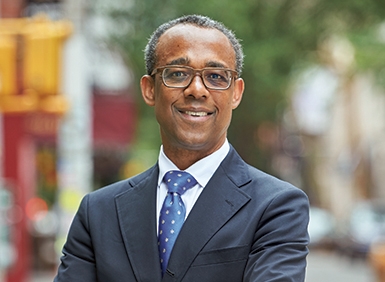New Faculty: Richard Brooks

When the Woods Hole Oceanographic Institution placed a camera on Martha’s Vineyard’s South Beach, it was to monitor shore erosion. Richard Brooks had a different idea and got permission to use it to collect data on how whites and blacks arrayed themselves on the beach in relation to each other—part of a larger study he is doing of racial interaction on the island that, much to his wife’s consternation, he conducts during family vacations there.
Nominally a contracts and corporate law specialist, Brooks has brought his wide-ranging and hard-to-categorize scholarship to NYU Law, where he is teaching in the fall and will formally become a full-time tenured faculty member in January. He was previously the Charles Keller Beekman Professor at Columbia Law School, which he joined in 2013 from Yale Law School, where he also held a chaired professorship.
A feeling of intellectual kinship drew Brooks to NYU. “NYU Law’s appeal is that so many of the faculty are broadly engaged in areas that matter to me,” he says. “People are not confined to niches, so if your interests cut across topics, you don’t have to sacrifice your broader concerns to feel a sense of community.” He was also impressed by the number of faculty members who are foreign born. “I think that’s just part of a larger engagement in global and diverse perspectives,” says Brooks, who lived in Jamaica until moving to Connecticut when he was seven.
With a PhD in economics from the University of California, Berkeley (as well as a JD from the University of Chicago), Brooks often engages in work with a strong empirical bent, though he notes that he is also “very skeptical about data generally.” In 2015, in a case before the US Supreme Court, he co-authored an amicus brief assailing data purporting to show that affirmative action harms its intended beneficiaries.
Much of what Brooks does also seems downright anthropological, such as his current project examining forms of address people use with each other (“Sir,” “Doctor,” “Master”), which, he says, “exert a profound influence on our civil, political, and social lives.” Indeed, in describing his approach as a scholar, Brooks points to French anthropologist Claude Lévi-Strauss and one of his oft-repeated assertions: “Every contract is an averted war and every war a failed contract,” as Brooks paraphrases it.
“When I think about contracts, it really is about social organization,” Brooks explains. That perspective informs Saving the Neighborhood: Racially Restrictive Covenants, Law, and Social Norms, a 2013 book he co-authored with Yale Law’s Carol Rose that explores the history of race restrictions in real estate deeds and their lingering influence long after they were outlawed. He is also a co-author of a traditional contracts casebook.
“Rick is curious about a lot of things, and he helps other people with their ideas,” says Rose. “I don’t collaborate often, but we fed off each other’s ideas.” She notes that their collaboration often took place in a New Haven coffee shop, and a coffee shop might be a good place to look for Brooks now that he’s relocated to Washington Square. “I like working in public spaces,” he says. “The noise and the buzz kind of help me to focus.” Plus, he has loved coffee ever since he was a child, when his Jamaican grandmother would make it for him heavily sweetened with condensed milk.
Brooks might also be found on a squash court or checking out a comic book shop with his 11th-grade daughter. (His son is a freshman at Brown University, and his wife, Heidi, a PhD psychologist, is on the faculty of the Yale School of Management.)
In coming to NYU, Brooks has reunited with his PhD thesis adviser from Berkeley, Professor Daniel Rubinfeld, who now teaches at the Law School. “As a student of law and economics,” Rubinfeld recalls, “Rick showed great enthusiasm, incredible breadth of thinking, and the dedication that made him an excellent prospect for success in the field.”
Success on the beach has proved more challenging. After waves from an offshore hurricane disrupted his data gathering on Martha’s Vineyard, Brooks moved his project inland. But there’s still the issue of the Vineyard being meant for relaxation, not research. “I’ve really got to cut that back,” he said with a laugh, contemplating his family’s upcoming trip there during the summer of 2017.
Posted September 1, 2017


